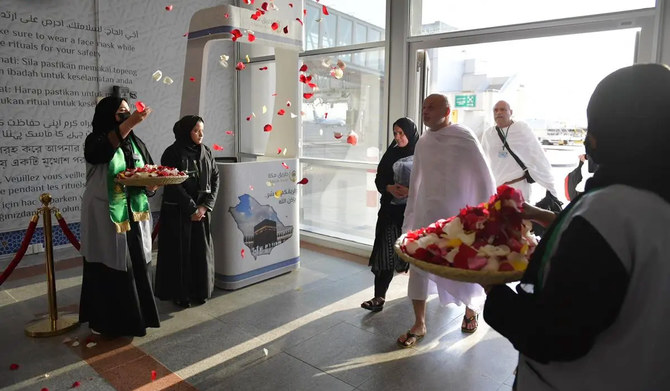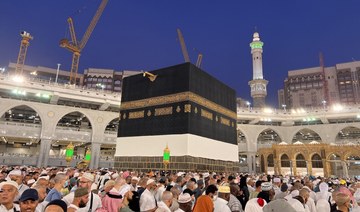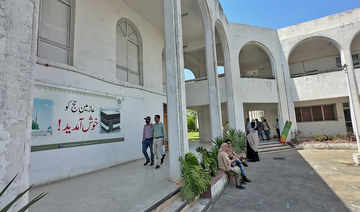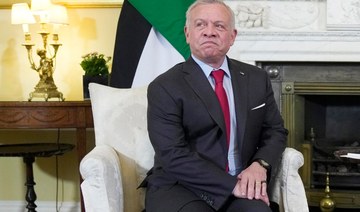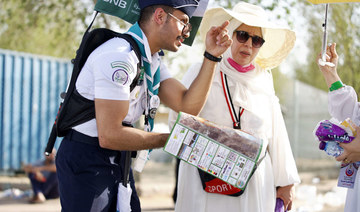ISLAMABAD: Over 65,000 Pakistani pilgrims are set to benefit from Saudi Arabia’s Makkah Route Initiative during this year’s Hajj pilgrimage, Pakistan’s religious affairs secretary said on Monday, compared with the 26,000 pilgrims who used the facility from the Pakistan capital in 2023.
Pakistani officials confirmed last week that Saudi authorities have approved the Makkah Route Initiative’s expansion to the airport in Karachi, the country’s most populous city.
Launched in 2019, the initiative was initially extended only to the airport in Islamabad.
The Makkah Route Initiative allows for the completion of immigration procedures at the pilgrims’ country of departure, making it possible to bypass long immigration and customs checks on reaching Saudi Arabia.
HIGHLIGHT
Pakistan will launch Hajj 2024 operations from May 9 in eight airports across the country till June 9. This year’s pilgrimage is expected to take place from June 14-19.
The facility significantly reduces waiting times, and makes the entry process smoother and faster.
Islamabad had asked Saudi authorities to extend the facility to other airports in the country.
“A total of 65,000 Hajj pilgrims will utilize the Route to Makkah facility at Karachi and Islamabad airports this year,” Syed Atta ur Rehman, Pakistan’s religious affairs secretary, told a media briefing.
Breaking down the numbers, Rehman said 41,000 of the 65,000 pilgrims will make use of the facility under the government’s Hajj scheme, while the remaining 24,000 will rely on private tour operators.
“Specifically, 29,500 pilgrims will use this facility from Islamabad, while 35,500 will do so from Karachi airport,” Rehman said, thanking the Saudi government for expanding the initiative to Karachi.
Saudi Arabia last year restored Pakistan’s pre-pandemic Hajj quota of 179,210 pilgrims and abolished the upper age limit of 65. More than 81,000 Pakistani pilgrims performed Hajj under the government scheme in 2023, while the rest used private tour operators.
Pakistan will launch Hajj 2024 operations from May 9 in eight airports across the country till June 9. This year’s pilgrimage is expected to take place from June 14-19.
The official said a total of 69,000 pilgrims will perform the pilgrimage under the government scheme this year. Of these, 64,000 pilgrims will perform under the general scheme, while over 5,000 will perform the pilgrimage under the sponsorship scheme.
The sponsorship Hajj scheme was introduced by the government last year, allowing overseas Pakistanis to apply for the pilgrimage or sponsor someone in Pakistan for the journey by paying in US dollars. In return, applicants would not have to participate in the balloting process for the pilgrimage.
Rehman said the remaining number of pilgrims will perform Hajj on the private scheme. However, he added their exact number is yet to be determined as bookings for the pilgrimage are still underway.
This year, he said, preparations for the Hajj began earlier as per the Saudi government’s requirements. This helped the government secure favorable accommodation for Pakistani pilgrims in the holy cities of Makkah, Madinah, and Mina, Rehman said.
Despite the surge in inflation globally, Rehman said the Pakistani government has reduced Hajj expenses by Rs100,000 ($358.76) compared with last year.
“Last year, the government charged Rs1,155,000 from the south zone and Rs1,175,000 from the north zone, whereas this year it is Rs1,055,000 and Rs1,075,000, respectively,” he said.
He added the government has reduced the cost of plane tickets from last year, bringing it down to between Rs15,000-35,000.
Under the government Hajj scheme this year, the secretary said pilgrims can opt for a shorter Hajj pilgrimage, but will need to pay an extra fee of up to Rs60,000.
“In addition to the usual 38 to 42-day Hajj duration, we have introduced the option of Hajj for 20 to 25 days,” Rehman said, adding that pilgrims can also choose exclusive options, such as staying in a single room with family members or fewer people by paying an additional amount.



